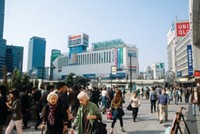Advertisement
Grab your lab coat. Let's get started
Welcome!
Welcome!
Create an account below to get 6 C&EN articles per month, receive newsletters and more - all free.
It seems this is your first time logging in online. Please enter the following information to continue.
As an ACS member you automatically get access to this site. All we need is few more details to create your reading experience.
Not you? Sign in with a different account.
Not you? Sign in with a different account.
ERROR 1
ERROR 1
ERROR 2
ERROR 2
ERROR 2
ERROR 2
ERROR 2
Password and Confirm password must match.
If you have an ACS member number, please enter it here so we can link this account to your membership. (optional)
ERROR 2
ACS values your privacy. By submitting your information, you are gaining access to C&EN and subscribing to our weekly newsletter. We use the information you provide to make your reading experience better, and we will never sell your data to third party members.
Business
Discovering Japan
Fine chemicals makers vie, with mixed results, for business with Japanese drug companies
by Michael McCoy
May 15, 2006
| A version of this story appeared in
Volume 84, Issue 20

New Japanese pharmaceutical regulations proposed at the start of the decade promised to kick off an outsourcing frenzy. Spurred by the rules, the thinking went, drug companies were going to turn over their pharmaceutical chemical manufacturing to outsiders, thereby creating a business boom for Japanese and foreign contract manufacturers alike.
Five years later, it's clear that those initial expectations were far too optimistic. Yes, the outsourcing of drug ingredients and active ingredients is modestly on the rise. But most Japanese drug companies have kept to their conservative ways and are embracing the practice only tentatively.
Moreover, restructuring at some drug companies is creating separate manufacturing subsidiaries that are starting to compete with traditional pharmaceutical chemical suppliers. And some outsourcing is going not to established Japanese and Western companies but to lower priced newcomers in India and China. On balance, many of the traditional firms are seeing little to no sales growth in Japan, although they remain optimistic that the outsourcing trend will eventually work to their benefit.
The regulation in question is Japan's Pharmaceutical Affairs Law. The revisions were passed in July 2002 and went into effect in April of last year. Simply put, they are an attempt by Japanese regulators to make their system of approvals for marketing and manufacturing new drugs more closely mimic that of the U.S. Food & Drug Administration.
Kenji Orihashi, pharmaceuticals business manager in the fine chemicals unit of Mitsubishi Corp., a Japanese trading company, explains that chemical makers that want to sell active pharmaceutical ingredients (APIs) in Japan now need to submit information about their compounds in a drug master file, or DMF, just as they do in the U.S. A DMF includes data in support of a company's filing for a drug. Over time, he anticipates, Japanese authorities will institute standards like FDA's current Good Manufacturing Practices (cGMP) and an FDA-like protocol for inspecting manufacturing facilities.
According to Orihashi, one advantage of such a system is that it allows information to flow freely among regulators, drug companies, and API suppliers without compromising confidential information. A big disadvantage is that it is much more cumbersome than the old, lightly regulated system.
For now, Orihashi says, the new rules are a paperwork headache for Mitsubishi and its fine chemicals industry partners, which include firms such as India's NPIL Pharma, Switzerland's Siegfried, and Italy's Miteni. But he sees an opportunity to sign up more foreign companies that are trying to crack the Japanese market. Firms that in the past might have plunged into the country directly will now enlist Mitsubishi to help them navigate the new filing landscape, Orihashi expects.
It's a myth that, prior to the revisions, Japanese drug companies weren't allowed to outsource pharmaceutical chemical production. Japanese firms such as the trading house Koa Shoji make a living by connecting the country's small but growing generic drug industry with active-ingredient suppliers. And although most big producers of patented drugs have formidable in-house manufacturing capabilities, even some of them outsource API production.
Early in the decade, for example, Fujisawa Pharmaceutical was under pressure to move production of the active ingredient in Cefzon, a cephalosporin antibiotic, out of congested Osaka, Japan. In 2002, it struck a deal under which Mitsubishi Chemical's API Corp. subsidiary would take over manufacturing for the Japanese market. Then, in 2005, the drug company, which was renamed Astellas Pharma following its merger that year with Yamanouchi Pharmaceutical, tapped API Corp. to produce Cefzon for export markets as well.
Fine chemicals executives acknowledge that such agreements are the exception, not the rule. "Japanese drug companies are still very conservative," says Kiyoshi Kondo, manager of API Corp.'s health care business division.
Nonetheless, Kondo and other observers see change afoot, change that is due as much to the avenues opened by the Pharmaceutical Affairs Law revisions as to the forces of competition, shareholder activism, and public pressure that are bearing down on pharmaceutical makers worldwide.
As evidence, they point to the Japanese drug companies that are cutting back or spinning off their extensive manufacturing networks. Early last year, for example, Chugai Pharmaceutical said it would whittle five Japanese plants down to just two over five years as it takes advantage of the manufacturing subcontracting that is facilitated by the new law. Then, in January, the company released plans for spinning off the remaining two facilities into a new subsidiary called Chugai Pharma Manufacturing.
On April 1, Astellas completed a similar move, creating a new chemical manufacturing subsidiary called Astellas Pharma Chemicals, which operates an API plant in Takahagi, Japan. Japanese fine chemicals executives anticipate a similar spin-off will be undertaken by Daiichi Sankyo, the drug company now in the process of being formed by the merger of Daiichi Pharmaceutical and Sankyo.
Takeda Pharmaceutical, Japan's largest drugmaker, hasn't announced any manufacturing consolidation, but the company said in its 2005 annual report that it has decreased drug production at its Japanese facilities from 70% of its total output in fiscal 2000 to 30% in fiscal 2004. The shift is due both to increased outsourcing and to the opening of a new pharmaceutical chemical plant in Ireland.
The spin-off announcements are being greeted warily by contract manufacturers. Layoffs are rare in Japan, notes Wilhelm Stahl, head of the pharma business line at Lanxess' new Saltigo custom manufacturing subsidiary in Germany, and such corporate reshuffling typically doesn't lead to staff reductions. So, in order to stay profitable, the new chemical manufacturing subsidiaries may be forced to compete with traditional contractors, such as Saltigo, for business from other drug firms.
API Corp.'s Kondo concurs. "The total amount of outsourcing opportunities is growing, but the number of competitors is growing too," he says. Indeed, competitors point out that API Corp., formed in 2002 at the dawn of the new regulatory system, is itself made up of fine chemicals production assets once operated by Mitsubishi Pharma, the drug arm of Mitsubishi Chemical.
Contract manufacturers have yet to run into the newer chemical production subsidiaries in the merchant market, but they see an ominous harbinger in Chugai's March announcement that it will outsource production of solid forms of four established products to MP-Technopharma, a dosage-form manufacturing subsidiary set up last year by Mitsubishi Pharma. Part of Mitsubishi Pharma's stated intent in forming the subsidiary was to capture third-party contract manufacturing business "in line with the revised Pharmaceutical Affairs Law."
On balance, though, there's cautious optimism in the contracting sector. The sentiment is shared by various players, from longtime Japanese fine chemicals suppliers to the local drug industry, to Western firms that have slowly been making inroads in the country over the past several years, to Indian firms that have only recently achieved sales success in Japan.
Masaki Shinoda, general manager for business development with API Corp.'s health care division, says his company should report sales of about $355 million in the fiscal year that ended March 31, up 7% from the previous year. Sales of APIs in particular are expected to be up 10 to 15%, he adds, thanks largely to increased outsourcing by local pharmaceutical companies.
Shinoda says these firms come to API Corp. because, although the firms' production quality is high, they don't always have the cGMP certification needed to sell products in the West. Western contractors like Lonza and DSM can also do the job to cGMP standards, he acknowledges, but they can't offer local production by a company that speaks the same language.
Masahiko Yamada, manager of the new products development group at Kaneka's fine chemicals division, is another Japanese executive who expects local fine chemicals companies to be the main beneficiaries of increased outsourcing by Japanese drugmakers. "Communication in Japanese, both written and oral, is very important," he says. "Our customers can meet with us at any time, and we can send them materials quickly."
Although Yamada is counting on most business staying in Japan, he says traditional ties within the Japanese industry are being shaken up. "The relationship between pharmaceutical company and supplier used to be very tight," he says. Today, however, cost pressures are prompting the companies to look outside their usual networks. "Kaneka is enjoying this atmosphere even more," Yamada says.
He says his company has improved its relationships with several large Japanese drug companies in recent years. It is now working with most of the top 20 firms in the country and is manufacturing compounds for Phase I and II clinical trials for several of them. Such products typically take advantage of Kaneka's unique combination of biotechnology and organic chemistry skills, Yamada adds.
While firms like Kaneka and API Corp. focus on the top tier of Japan's pharmaceutical industry, relative newcomer Beta-Chem is taking a different tack: developing business with small and emerging drug companies, both in Japan and the U.S.
The Japanese trading house Mitsui & Co. formed Beta-Chem in 2001 to consolidate its business in pharmaceutical chemical procurement. Beta-Chem's president and chief scientific officer is Ichiro Shinkai, who worked in the U.S. for some 20 years. His last U.S. job, from 1992 to 1996, was as senior vice president of process R&D at Merck.
Shinkai says Beta-Chem started by pursuing business with large international drug companies but soon found they infrequently needed its service, which entails working with more than 30 Mitsui partners—from raw material suppliers to cGMP-certified API manufacturers—to facilitate multistep pharmaceutical chemical synthesis.
Today, most of his business is with emerging drug companies that do need such assistance. Shinkai says Beta-Chem has coordinated the manufacturing of 40 to 45 advanced drug intermediates and APIs, including three APIs that are now in Phase III clinical trials. About 70% of Beta-Chem's projects are for Japanese companies, although sales are split roughly 50-50 between Japan and the U.S., reflecting the more advanced state of the U.S. biopharmaceutical pipeline.
According to Shinkai, a typical Beta-Chem project starts with process development at J-Star Research, a New Jersey-based partner company headed by Andrew S. Thompson, a chemist who worked under Shinkai at Merck. After a viable synthetic route is developed, raw materials might be procured in China, followed by initial production steps in India. The final steps could then be carried out at a cGMP-certified facility in Japan.
Although most customers still want these final stages done in Japan, in general, "Japanese chemical companies are losing their competitive edge to India and China," Shinkai warns. Beta-Chem is sending more and more work to India and China, he notes, and has even hired three chemists in India to develop chemical syntheses.
Beta-Chem isn't the only Japanese pharmaceutical chemical firm turning to India and China for lower cost materials and labor. Kaneka's Yamada and API Corp.'s Kondo both confirm that their companies are increasingly sourcing raw materials from these countries.
Among Japan's drugmakers, Eisai is particularly aggressive in its embrace of India. In its most recent five-year plan, announced in February, Eisai said it would make use of India's scientific resources by expanding functions there such as medicinal chemistry, process chemistry, formulation research, and production.
Not surprisingly, Chinese and Indian companies that in the past were happy to supply raw materials to Japanese firms are now ambitiously angling to sell advanced drug intermediates and even APIs. At the recent CPhI Japan pharmaceutical ingredients trade show in Tokyo, numerous firms from these countries had set up booths to court Japanese drugmakers.
One of them was Hikal, a Mumbai, India-based fine chemicals manufacturer that recently struck a nonexclusive agreement to supply advanced drug intermediates and APIs to Degussa's exclusive synthesis unit.

Sameer Hiremath, Hikal's executive director, said his company has been coming to CPhI Japan since 2003. "The mood has definitely changed in the past few years," he said. Japan has lagged the U.S. and Europe in embracing Indian pharmaceutical chemical production, but drug companies are starting to come around, he said. "We don't have to sell them on the country anymore."
Although Hikal sells agrochemical active ingredients to Japanese crop protection companies, Hiremath acknowledged that Japan's big drug companies are wary of going beyond the purchase of intermediates from an Indian firm. "They're not ready yet," he said.
Advertisement
Dishman Pharmaceuticals & Chemicals, on the other hand, is betting that Japan's generic drug sector is ready to do business with an Indian firm. In January, citing the Pharmaceutical Affairs Law revisions, the Ahmedabad-based fine chemicals maker announced that it had initiated discussions with several Japanese companies about producing generic APIs in Japan. Under such a deal, Dishman would transfer process technology to a Japanese partner's site and possibly supply intermediates needed for the process.
According to Henk Pluim, Dishman's director of technology transfer, his company has sold intermediates to Japanese pharmaceutical chemical firms for several years. "With the change in legislation, we saw an opportunity to work with some of these companies more closely," he says.
With Asian firms of all sorts targeting the Japanese pharmaceutical chemical market, the opportunities for higher cost Western companies might seem limited, but that isn't stopping them from trying. So far, inroads have been modest, and the successful firms are the ones offering technologies or services that are hard to find in Japan.
Saltigo's Stahl says his business unit reinforced its effort to enter the Japanese market in late 2003. Stahl wasn't expecting quick results. "Our rule of thumb when it comes to building a relationship with a Western company is about three years," he says. "In Japan, we think more about five years."
So he was pleasantly surprised when Saltigo recently netted a contract to manufacture a Japanese firm's drug for clinical trials. Stahl's experience is that such companies typically seek a Japanese fine chemicals maker as their primary supplier and a non-Japanese firm as a secondary source. Saltigo clinched this particular deal, he adds, because the drug's synthesis is complex and it requires some hazardous chemistry.
Some Western companies are making headway in Japan on the strength of their experience in small-volume manufacturing services for the early phases of drug development or for their experience with making high-potency compounds that are needed only in small quantities.
Although API Corp. opened a plant three years ago dedicated to production of drugs in small quantities for clinical trials, capacity of this sort has traditionally been hard to find in Japan. And some observers point to Nippon Kayaku as the rare Japanese contract manufacturer with capacity to produce Category 4 cytotoxic compounds, the most potent kind.
Ken Niwa, fine chemicals sales specialist for Japan at SAFC, the fine chemicals business of Sigma-Aldrich, says big Japanese drugmakers are often interested in his firm's high-potency compound facility in Madison, Wis. "It's difficult for us to get business in standard products," he says. "There are many Japanese companies that make APIs." Small or midsized Japanese firms gravitate toward SAFC's lead optimization capabilities in Manchester, England, Niwa adds.
Marcel Hogerheide, market development specialist for Solutia's CarboGen and AMCIS process development business, says his company actively started pursuing Japanese sales four years ago, around the time that the Pharmaceutical Affairs Law revisions were passed. Last year, he adds, about 10% of revenue came from firms based in the Asia-Pacific region, and that proportion continues to rise.
Hogerheide avidly pursues customers needing highly potent or cytotoxic compounds, because such firms typically require small quantities of API. Carbogen and AMCIS plants in Switzerland aren't intended for high-volume production, but they can handle most highly potent and cytotoxic compounds, even into commercial launch. "The chance to pick up a project in development and retain it on commercial scale is very interesting to us," he says.
Hogerheide and other fine chemicals executives—be they from Japan, India, or the West—say they are willing to be patient and wait for contract manufacturing business to emerge with Japan's conservative drug companies. Because, as Saltigo's Stahl says, landing business with and supporting such firms has a very satisfying payoff: "They usually stay committed to their long-term partners."






Join the conversation
Contact the reporter
Submit a Letter to the Editor for publication
Engage with us on Twitter